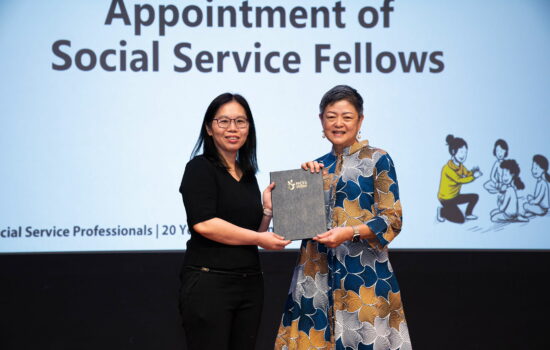If you head to the Sheltered Workshop at Level 2 of the SPD Ability Centre, you would most definitely see R.Manoogar, affectionately known as Manoo to many, interacting with the trainees and guiding them in their tasks. Taking time out of his busy schedule to speak with UPDATES, he recalls why he decided to step into the social service sector and how it shaped his perspective of the world.
Tell us a little more about yourself.
I am 58 years old, married with two girls and a boy. I started working at SPD in 2005.
What were you doing before SPD? Why did you choose to leave that behind and join SPD?
Before SPD, I was in the chemical manufacturing line for 22 years! I was the assistant plant manager and the workload started piling up. I realised that I did not have time for my family and kids. The desire to spend time with them was the main reason I decided to leave the job. My kids were little then, and I felt inclined to spend more time with them during those formative years.
How did you find out about SPD’s workshop supervisor vacancy?
It was through an advertisement published in the newspapers. I was looking at the jobs available and I saw that a workshop supervisor role was available. I had no idea what it was about and the newspaper clipping did not provide much information. I simply went for the interview and was surprised that the job required me to work with people with disabilities.
How did you feel after you understood what the job entailed?
During the interview, I realised that I was getting into something that I had never been exposed to. Working with people with disabilities held a whole new level of responsibilities. I was a little hesitant at the start, to be honest. I took the job and told myself to try and adapt.
How did you adapt? Can you remember what the early days were like?
There were many things to get used to. The challenging part at first was to understand the different disabilities that the trainees had and their limitations. It was strange to me at the start – simple tasks weren’t simple at all to them. It took me a while to get used to that and it trained me to be patient. I learned over the years that it is normal for new workshop supervisors to take some time to understand the trainees and what they can or cannot do. It is all a part of the relationship-building process. Without the relationships with the trainees, we cannot hope to supervise them well.
What are the daily tasks of a workshop supervisor?
As a workshop supervisor, we have both operational and supervisory roles. We plan and assign clients to projects suitable given their skills and abilities. As we get to know the clients better, we also make sure we train them in hard and soft skills. Part of being a workshop supervisor is to be observant and look out for the clients as they go about their work, and help them if needed.

What is the difference between this role and your previous role as an assistant plant manager?
They are worlds apart. In the previous job, I achieved tangible comforts such as a good income and a managing role but there was rarely any fulfillment in all that I was doing. I found the missing fulfillment when I joined SPD. At SPD, I not only get to help people with disabilities, I also hear their stories and am a part of their lives. I have no regrets. For me, job satisfaction is important. I would never have thought that I would stay for so many years!
How did your mentality change?
As I chose to continue on and got to know the trainees better, I realised that I could play a part in their lives in so many different yet positive ways. It gave me a sense of fulfillment and attachment to the job and the people. It took me around three months to adapt to the work but after that, it was clear to me that this is a job that is worth doing.
How do you cultivate relationships with the clients?
For me, respect is the key to cultivating lasting relationships. No matter who we are, what disabilities we have, we all deserve equal respect. I have learned over the years that respecting people is never wrong. Respect comes in many forms. We can show respect them through our words and also our actions. Only then, relationships can grow.
What are some of the best moments you’ve experienced working at SPD?
I’ve witnessed amazing success stories while working in the workshop. One of our trainees got the green light to head back into open employment after many years as a trainee. Seeing him grow and become better and better only prompted me to want to push the clients to achieve their best. He joined a cleaning service and he is very happy!

Do you have any words of encouragement to share with others working with persons with disabilities?
There is great fulfillment and joy when you can play a part in the lives of others. One has to have a lot of patience. The clients will take time to warm up and learn, so my advice is to be patient.





